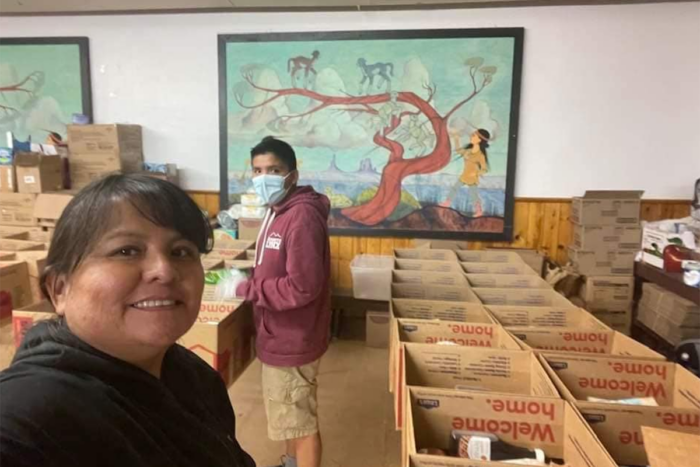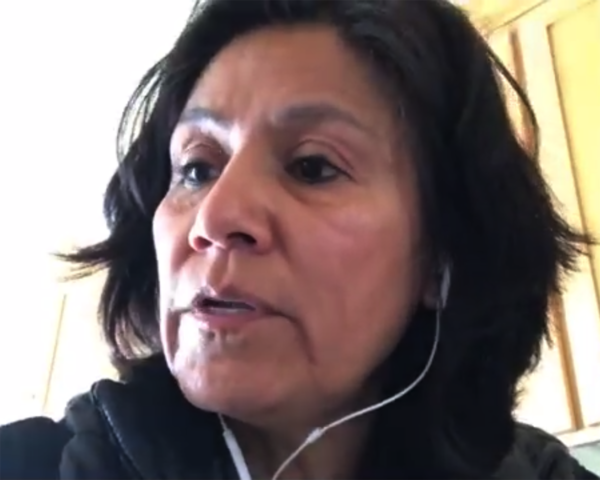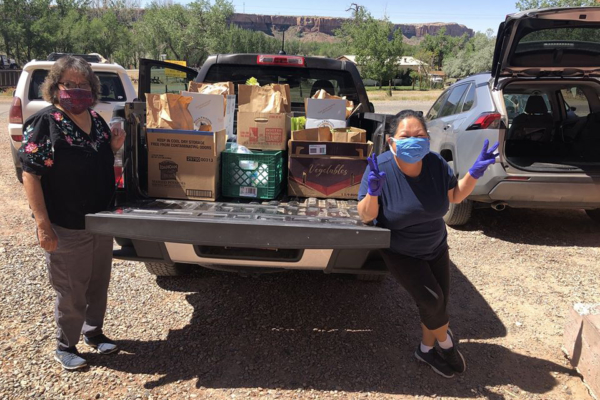Navajoland seeks to become missionary diocese in resolution proposed to 81st General ConventionPosted Apr 24, 2024 |
|

Volunteers at Good Shepherd Mission in Fort Defiance, Arizona, fill boxes of food for delivery to Navajo Nation residents as part of a feeding ministry of the Episcopal Church in Navajoland in November 2021. Photo: Leon Sampson
[Episcopal News Service] Navajo Episcopalians are asking The Episcopal Church to elevate their area mission, known as Navajoland, to the status of a missionary diocese – a step that, if approved in June by the 81st General Convention, would enable Navajoland to elect its own bishop while continuing to receive financial support from the wider church.
The change is proposed by Resolution C009, which was endorsed and submitted by a special convocation held in January by the Episcopal Church in Navajoland. Episcopal leaders there worked on the plan with the church’s Standing Commission on Structure, Governance, Constitution and Canons. Their work followed a previous resolution, approved in 2022 by the 80th General Convention, entrusting Navajoland “to establish its own rules and procedures for a process of discernment for the calling of a bishop that reflects the values, teachings, and traditions of the Diné.”
In Navajoland, “we have a church that is growing,” the Rev. Cornelia Eaton, the area mission’s canon to the ordinary, told Episcopal News Service. Eaton is one of five ordained Navajo clergy now actively serving Navajo Nation communities, and in recent years, they and other church members have expanded Navajoland’s ministries that serve local residents and bolster the mission’s financial sustainability, from starting a beekeeping operation to the opening of the Hozho Wellness Center.
As an area mission, however, Navajoland’s bishop is appointed by the House of Bishops. At the January convocation, “there was a lot of energy around people wanting to become a missionary diocese. … A lot of the elders spoke up in support,” Eaton told ENS. “It gives us the autonomy to select or have an election for a bishop.”
The Navajo people have their own ways of raising up leadership, Eaton added, “a Navajo traditional cultural way of doing that.”

The Rev. Cornelia Eaton, canon to the ordinary for the Episcopal Church in Navajoland, participates in an April 2020 meeting on Zoom with other Episcopal clergy and lay leaders serving indigenous communities.
She and other Navajoland leaders are expected to testify in favor of the resolution at a hearing at 8 p.m. Eastern April 30 on Zoom, hosted by General Convention’s Governance & Structure committees. Anyone interested in observing or testifying at the hearing is asked to register in advance.
The Episcopal Church’s ministry on the 27,000-square-mile Navajo reservation dates back more than a century to medical missions established in Fort Defiance, Arizona; Farmington, New Mexico; and Bluff, Utah. In 1978, the Episcopal Church carved out sections of the dioceses of Rio Grande, Arizona and Utah to create the Navajoland Area Mission.
After the 2022 resolution by General Convention encouraging Navajoland to develop a process for calling its own bishop, the Standing Commission on Structure, Governance, Constitution and Canons created a subcommittee to work with Navajoland on the details. The Rev. Rachel Taber-Hamilton, the House of Deputies vice president, chaired the subcommittee.
Taber-Hamilton, who is Shackan First Nation and serves as a priest in the Diocese of Olympia, told ENS that the church is striking the right balance by supporting Navajoland without dictating where that support will lead. “It really feels like we’re moving away from a patriarchal model to one that’s genuinely empowering,” Taber-Hamilton told ENS.
Under Title I, Canon 11 of The Episcopal Church Canons, area missions and missionary dioceses both “constitute jurisdictions for which this church as a whole assumes a special responsibility.”
In an area mission, the House of Bishops assigns one of its own to “exercise jurisdiction as a missionary bishop” on matters of governance, ministry and worship. The Rt. Rev. Barry Beisner, formerly bishop of Northern California, has served Navajoland in that capacity since May 2023, succeeding Bishop David Bailey.
Unlike an area mission, a missionary diocese is empowered to adopt its own constitution and canons, in compliance with The Episcopal Church Constitution and Canons, while also holding an annual diocesan convention and electing a bishop, standing committee, and clergy and lay deputations to General Convention.
“The convention of a missionary diocese shall also adopt an annual budget and program for the diocese, and provide for the means of its administration throughout the year,” the canon says, “and shall make provision for the review and approval of requests for grants in aid from the Executive Council or other sources of funds, both toward current operations and for capital needs.”
In the explanatory text accompanying Navajoland’s request to become a missionary diocese, it notes that the area mission “was already operating very much like a missionary diocese.” Navajoland leaders, though, raised concerns about maintaining financial assistance in the churchwide budget.
“Parishioners give what they can to their churches but their monetary contributions are not sufficient to sustain a budget that must pay salaries and provide benefits for staff, pay utilities and maintenance for buildings and much more,” Eaton wrote in narrative budget document attached to the resolution. “The Episcopal Church has provided grants to [Navajoland] but even those grants have not been enough to cover all budget items.”
Navajoland chose to move forward with its push to become a missionary diocese, Eaton wrote, with the hope that it will continue to receive financial backing from The Episcopal Church.
The proposed 2025-27 churchwide budget plan includes $800,000 over three years for a bishop serving Navajoland and an additional three-year block grant of nearly $1.5 million to support Navajoland’s congregations and ministries.
Separately, the 81st General Convention will consider three resolutions aiming to address inequities in the church’s denominational health plans, some of which were discovered when Navajoland employees testified that they had effectively opted out of the plans because of the cost.
Executive Council approved $150,000 in emergency relief to cover Navajoland’s health insurance premiums for 2024. The proposals to the 81st General Convention aim to ensure that coverage will continue.
– David Paulsen is a senior reporter and editor for Episcopal News Service based in Wisconsin. He can be reached at dpaulsen@episcopalchurch.org.


Social Menu